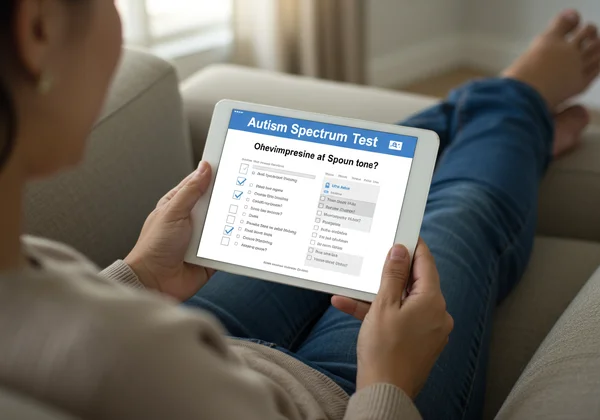การเตรียมตัวสำหรับการทดสอบและประเมินภาวะออทิสติกสเปกตรัม: การพูดคุยกับแพทย์ของคุณ
October 27, 2025 | By Leo Whitaker
การเดินทางเมื่อสงสัยว่าลูกของคุณอาจมีภาวะออทิสติกอาจเป็นเรื่องที่หนักใจ คุณสังเกตเห็นความแตกต่างในการมีปฏิสัมพันธ์ทางสังคม การสื่อสาร หรือพฤติกรรม และตอนนี้คุณต้องเผชิญกับขั้นตอนสำคัญในการพูดคุยกับผู้เชี่ยวชาญด้านสุขภาพ คู่มือนี้จะช่วยให้ผู้ปกครองที่มีความกังวลมีแผนการที่ชัดเจน เป็นขั้นเป็นตอน เพื่อเตรียมตัวและเข้าถึงการสนทนาเหล่านี้อย่างมั่นใจ เพื่อให้แน่ใจว่าลูกของคุณจะได้รับการดูแลที่เหมาะสม ขั้นตอนแรกมักจะเป็นการจัดระเบียบความคิดของคุณ และ การทดสอบเบื้องต้นสำหรับภาวะออทิสติกสเปกตรัม สามารถเป็นเครื่องมือที่มีคุณค่า บทความนี้จะช่วยให้คุณรวบรวมข้อมูลที่คุณต้องการได้อย่างมั่นใจ เพื่อให้คุณพร้อมสำหรับการสนทนาเกี่ยวกับการ ทดสอบภาวะออทิสติกสเปกตรัม และการประเมินอย่างเป็นทางการ
การใช้เวลาจัดโครงสร้างข้อสังเกตของคุณสามารถสร้างความแตกต่างได้มาก การคัดกรองออนไลน์สามารถเป็นรายการตรวจสอบที่เป็นประโยชน์ เพื่อให้ไม่ลืมรายละเอียดสำคัญระหว่างการนัดหมาย คุณสามารถ เริ่มต้นอย่างชัดเจน บนแพลตฟอร์มของเราเพื่อช่วยจัดระเบียบข้อกังวลของคุณก่อนการเยี่ยมชม

การเตรียมตัวที่จำเป็นก่อนไปพบแพทย์
การเตรียมตัวที่เหมาะสมคือกุญแจสำคัญในการสนทนาที่มีประสิทธิภาพกับกุมารแพทย์ของคุณ การเข้าพบแพทย์พร้อมบันทึกที่จัดระเบียบ ตัวอย่างที่ชัดเจน และประวัติพัฒนาการที่สมบูรณ์ จะเปลี่ยนข้อกังวลที่คลุมเครือของคุณให้เป็นข้อมูลที่นำไปปฏิบัติได้ สิ่งนี้จะช่วยให้คุณและแพทย์ทำงานร่วมกันได้อย่างมีประสิทธิภาพเพื่อความเป็นอยู่ที่ดีของบุตรหลาน แนวทางที่มีโครงสร้างจะช่วยให้ทุกรายละเอียดที่สำคัญได้รับการสื่อสาร ปูทางไปสู่กระบวนการ การเตรียมตัวสำหรับการประเมินภาวะออทิสติก ที่ประสบความสำเร็จ
การรับรู้และบันทึกสัญญาณที่อาจบ่งบอกถึงภาวะออทิสติก
ก่อนที่จะพูดคุยถึงข้อกังวลของคุณ คุณต้องระบุให้ชัดเจน ข้อสังเกตของคุณคือข้อมูลที่มีค่าที่สุดที่คุณสามารถให้ได้ เริ่มต้นสมุดบันทึกหรือเอกสารดิจิทัลเพื่อบันทึกพฤติกรรมและเหตุการณ์ที่เกิดขึ้น ข้อความคลุมเครือ เช่น "เขาเข้าสังคมไม่เก่ง" มีประโยชน์น้อยกว่าตัวอย่างที่เป็นรูปธรรมมาก
มุ่งเน้นไปที่การบันทึก สัญญาณของภาวะออทิสติกที่จะบอกแพทย์ของคุณ พิจารณาหมวดหมู่เหล่านี้:
-
การสื่อสารและปฏิสัมพันธ์ทางสังคม:
- ลูกของคุณมีปัญหาในการสบตาหรือรักษาระดับการสบตาหรือไม่?
- พวกเขามีปัญหาในการเริ่มต้นหรือสนทนาต่อเนื่องหรือไม่?
- พวกเขามีปัญหาในการเข้าใจสัญญาณที่ไม่ใช่คำพูด เช่น สีหน้าหรือภาษากายหรือไม่?
- พวกเขาชอบเล่นคนเดียวหรือมีปัญหาในการแบ่งปันความสนุกกับผู้อื่นหรือไม่?
-
พฤติกรรมซ้ำๆ และความสนใจที่จำกัด:
- ลูกของคุณมีความสนใจอย่างมากในหัวข้อเฉพาะ (เช่น รถไฟ ตัวเลข รายการทีวีเฉพาะ) หรือไม่?
- พวกเขามีการเคลื่อนไหวซ้ำๆ เช่น การโบกมือ การโยกตัว หรือการหมุนตัว (stimming) หรือไม่?
- พวกเขายืนกรานอย่างมากในเรื่องความสม่ำเสมอและกิจวัตร และจะรู้สึกไม่สบายใจกับการเปลี่ยนแปลงเล็กน้อยหรือไม่?
-
ความไวต่อประสาทสัมผัส:
- ลูกของคุณมีปฏิกิริยาผิดปกติกับเสียง พื้นผิว รสชาติ หรือแสงหรือไม่? (เช่น ปิดหูเมื่อมีเสียงดัง เป็นคนเลือกกินมาก)
- พวกเขาดูเหมือนจะไม่ตอบสนองต่อความเจ็บปวดหรืออุณหภูมิหรือไม่?

การสร้างประวัติพัฒนาการที่ครอบคลุมของบุตรหลานของคุณ
แพทย์จะต้องทำความเข้าใจพัฒนาการทั้งหมดของบุตรหลานของคุณ การรวบรวมข้อมูลนี้ล่วงหน้าจะช่วยประหยัดเวลาและให้บริบทที่สำคัญ เป้าหมายของคุณคือการสร้าง ประวัติพัฒนาการ โดยละเอียดที่แสดงภาพรวมชีวิตของบุตรหลานของคุณตั้งแต่แรกเกิดจนถึงปัจจุบัน
รวมประเด็นสำคัญต่อไปนี้ในไทม์ไลน์ของคุณ:
- พัฒนาการสำคัญ: จดบันทึกว่าลูกของคุณยิ้มครั้งแรก พูดอ้อแอ้ เดิน และพูดคำแรกเมื่อใด มีพัฒนาการสำคัญใดล่าช้าอย่างมีนัยสำคัญหรือไม่?
- พัฒนาการทางสังคม: อธิบายว่าพวกเขาปฏิสัมพันธ์กับเพื่อนและสมาชิกในครอบครัวอย่างไรในแต่ละช่วงวัย
- ประวัติทางการแพทย์: รวมถึงปัญหาสุขภาพที่เกี่ยวข้อง การประเมินที่ผ่านมา หรือการบำบัด
- ประวัติครอบครัว: ระบุว่ามีสมาชิกในครอบครัวคนใดได้รับการวินิจฉัยว่าเป็นออทิสติกหรือมีภาวะพัฒนาการทางระบบประสาทที่เกี่ยวข้องหรือไม่
- ความคิดเห็นจากโรงเรียน/สถานรับเลี้ยงเด็ก: ครูหรือผู้ดูแลสังเกตเห็นอะไรบ้าง? หากเป็นไปได้ ให้ขอความคิดเห็นจากพวกเขา
ไทม์ไลน์นี้จะให้ข้อมูลพื้นฐานที่เป็นกลางที่แพทย์ของคุณต้องการเพื่อประเมินข้อกังวลเฉพาะของคุณ การใช้ การทดสอบภาวะออทิสติกออนไลน์ มักจะช่วยให้คุณสามารถระลึกและจัดโครงสร้างรายละเอียดพัฒนาการที่สำคัญเหล่านี้ได้
การสื่อสารข้อกังวลของคุณกับแพทย์อย่างมีประสิทธิภาพ
เมื่อมีบันทึกและเอกสารอยู่ในมือ คุณก็พร้อมสำหรับการนัดหมาย เป้าหมายของการประชุมนี้คือการเปิดบทสนทนา แบ่งปันข้อสังเกตของคุณอย่างชัดเจน และร่วมกันตัดสินใจเกี่ยวกับขั้นตอนต่อไป โปรดจำไว้ว่าคุณคือผู้สนับสนุนหลักของบุตรหลานของคุณ การสื่อสารอย่างมีประสิทธิภาพมีความสำคัญอย่างยิ่งต่อการก้าวไปข้างหน้าและได้รับการสนับสนุนที่บุตรหลานของคุณอาจต้องการ
สิ่งที่คาดหวังระหว่างการสนทนาประเมินภาวะออทิสติกเบื้องต้น
การรู้ว่าสิ่งใดจะเกิดขึ้นสามารถช่วยลดความวิตกกังวลและช่วยให้คุณมีสมาธิได้ การ สนทนาประเมินภาวะออทิสติกเบื้องต้น มักจะเป็นการสนทนา ไม่ใช่การประเมินอย่างเป็นทางการ แพทย์ของคุณอาจจะ:
-
รับฟังข้อกังวลของคุณ: นี่คือส่วนที่บันทึกที่คุณเตรียมมามีประโยชน์อย่างยิ่ง เริ่มต้นด้วยการกล่าวอย่างชัดเจนว่า "ฉันมีความกังวลเกี่ยวกับการพัฒนาการของลูก และอยากจะพูดคุยถึงความเป็นไปได้ของภาวะออทิสติก"
-
ถามคำถามเฉพาะเจาะจง: แพทย์จะถามเกี่ยวกับพฤติกรรมที่คุณได้บันทึกไว้ ประวัติพัฒนาการของลูก และวิธีการทำงานของพวกเขาที่บ้านและที่โรงเรียน
-
สังเกตลูกของคุณ: แพทย์จะโต้ตอบและสังเกตลูกของคุณระหว่างการเยี่ยมชม เพื่อดูพฤติกรรมบางอย่างด้วยตัวเอง
-
พูดคุยเกี่ยวกับขั้นตอนต่อไป: จากการสนทนา แพทย์อาจแนะนำแนวทาง "เฝ้าระวังและรอ" ให้แหล่งข้อมูล หรือส่งต่อคุณไปยังผู้เชี่ยวชาญเพื่อการประเมินอย่างเป็นทางการ

คำถามสำคัญที่ควรถามกุมารแพทย์เกี่ยวกับภาวะออทิสติกในเด็ก
นี่คือการสนทนาสองทาง การที่คุณได้รับข้อมูลก็สำคัญไม่แพ้การให้ข้อมูล การมีรายการคำถามที่เตรียมไว้จะช่วยให้คุณออกจากสำนักงานด้วยความชัดเจนและแผนการ
นี่คือ คำถามสำคัญบางประการที่ควรถามกุมารแพทย์ของคุณ:
- "จากสิ่งที่ฉันได้แบ่งปันไป คุณคิดว่าจำเป็นต้องมีการประเมินภาวะออทิสติกอย่างเป็นทางการหรือไม่?"
- "กระบวนการในการส่งต่อไปยังผู้เชี่ยวชาญเป็นอย่างไร?"
- "คุณแนะนำผู้เชี่ยวชาญคนใดในพื้นที่ของเรา (เช่น กุมารแพทย์พัฒนาการ นักจิตวิทยาเด็ก)?"
- "มีแนวทางอื่นใดที่เราควรพิจารณาที่อาจอธิบายพฤติกรรมเหล่านี้ได้หรือไม่?"
- "เราสามารถเข้าถึงแหล่งข้อมูลในท้องถิ่นหรือบริการช่วยเหลือในระยะเริ่มต้นใดได้บ้างในขณะที่เรารอการประเมิน?"
แนวทางเชิงรุกนี้แสดงให้เห็นว่าคุณเป็นพันธมิตรที่มีส่วนร่วมในสุขภาพของบุตรหลานของคุณ และช่วยให้คุณ เริ่มต้นกระบวนการ ด้วยความเข้าใจที่ชัดเจน
การดำเนินขั้นตอนต่อไป: จากการส่งต่อสู่การวินิจฉัยภาวะออทิสติกในเด็ก
การไปพบแพทย์ครั้งแรกมักเป็นจุดเริ่มต้นของกระบวนการที่ยาวนานขึ้น หากแพทย์เห็นด้วยว่าจำเป็นต้องมีการประเมิน คุณจะเข้าสู่ขั้นตอนต่อไป: การแสวงหา การทดสอบภาวะออทิสติกสเปกตรัม และการวินิจฉัยอย่างเป็นทางการ เส้นทางนี้เกี่ยวข้องกับผู้เชี่ยวชาญ การประเมินอย่างละเอียด และการสร้างเครือข่ายสนับสนุนสำหรับครอบครัวของคุณ
การทำความเข้าใจการส่งต่อสำหรับการประเมินโดยผู้เชี่ยวชาญ
กุมารแพทย์ทั่วไปมักจะไม่วินิจฉัยภาวะออทิสติก พวกเขาจะส่งต่อคุณไปยังผู้เชี่ยวชาญหรือทีมงานมืออาชีพที่ได้รับการฝึกอบรมในการวินิจฉัยภาวะพัฒนาการทางระบบประสาท การประเมินโดยผู้เชี่ยวชาญ เหล่านี้มีความครอบคลุมและออกแบบมาเพื่อให้ได้ภาพรวมที่สมบูรณ์ของจุดแข็งและความท้าทายของบุตรหลานของคุณ
ผู้เชี่ยวชาญที่คุณอาจถูกส่งต่อไปหา ได้แก่:
- กุมารแพทย์พัฒนาการ: แพทย์ที่เชี่ยวชาญด้านพัฒนาการเด็ก
- นักจิตวิทยาเด็กหรือนักประสาทวิทยาเด็ก: ผู้เชี่ยวชาญด้านพฤติกรรมเด็กและการทำงานของสมอง
- นักประสาทวิทยาเด็ก: แพทย์ที่มุ่งเน้นภาวะทางสมอง
การประเมินอย่างเป็นทางการอาจเกี่ยวข้องกับการสัมภาษณ์ผู้ปกครอง การสังเกตโดยตรงและการโต้ตอบกับบุตรหลานของคุณผ่านการทดสอบมาตรฐาน และแบบสอบถามสำหรับผู้ปกครองและครู
การสร้างระบบสนับสนุนสำหรับบุตรหลานและครอบครัวของคุณ
ไม่ว่าคุณจะกำลังรอการประเมินหรือเพิ่งได้รับการวินิจฉัย การสร้าง ระบบสนับสนุน ที่แข็งแกร่งเป็นสิ่งสำคัญ คุณไม่ได้อยู่คนเดียวในการเดินทางครั้งนี้ การเชื่อมโยงกับผู้อื่นที่เข้าใจสามารถช่วยบรรเทาอารมณ์และให้คำแนะนำที่เป็นประโยชน์ได้
พิจารณาการแสวงหา:
- กลุ่มสนับสนุนผู้ปกครอง: กลุ่มท้องถิ่นหรือออนไลน์สำหรับผู้ปกครองของเด็กออทิสติกสามารถเป็นแหล่งข้อมูลและชุมชนที่ยอดเยี่ยม
- ทรัพยากรของโรงเรียน: พูดคุยกับโรงเรียนของบุตรหลานของคุณเกี่ยวกับแผนการศึกษาเฉพาะบุคคล (IEP) หรือแผน 504 เพื่อให้แน่ใจว่าพวกเขาได้รับการปรับเปลี่ยนที่เหมาะสม
- บริการบำบัด: สำรวจทางเลือกต่างๆ เช่น กายภาพบำบัด กิจกรรมบำบัด และพฤติกรรมบำบัดที่สามารถช่วยให้บุตรหลานของคุณพัฒนาทักษะและเติบโตได้ดี
การสร้างเครือข่ายนี้ตั้งแต่เนิ่นๆ จะเป็นรากฐานแห่งความแข็งแกร่งสำหรับทั้งครอบครัวของคุณ โปรดจำไว้ว่ามีแหล่งสนับสนุนอยู่ และการเริ่มต้นบนเว็บไซต์ของเราสามารถช่วยให้คุณ สำรวจทางเลือกการสนับสนุน ได้

เสริมพลังการเดินทางของคุณ: การสนับสนุนความเป็นอยู่ที่ดีของบุตรหลานของคุณ
การเตรียมตัวสำหรับการประเมินภาวะออทิสติกเป็นการกระทำเชิงรุกและด้วยความรักในการสนับสนุนบุตรหลานของคุณ ด้วยการบันทึกข้อสังเกตอย่างรอบคอบ การรวบรวมประวัติพัฒนาการ และการสื่อสารอย่างชัดเจนกับผู้เชี่ยวชาญด้านสุขภาพ คุณจะมั่นใจได้ว่าข้อกังวลของคุณจะได้รับการรับฟังและให้คุณค่า การเดินทางนี้ต้องใช้ความอดทนและความพากเพียร แต่ทุกก้าวที่คุณเดินจะนำคุณเข้าใกล้การทำความเข้าใจความต้องการเฉพาะของบุตรหลานของคุณ และการได้รับการสนับสนุนที่เหมาะสมเพื่อให้พวกเขาเจริญรุ่งเรือง
การเดินทางของคุณเริ่มต้นด้วยก้าวแรกที่มีการจัดระเบียบ ก่อนการนัดหมายกับแพทย์ ลองใช้เครื่องมือคัดกรองฟรีและเป็นความลับของเราเพื่อรวบรวมและจัดโครงสร้างความคิดของคุณ เป็นวิธีง่ายๆ ในการเปลี่ยนข้อสังเกตของคุณให้เป็นบทสรุปที่ชัดเจน ซึ่งสามารถนำทางการสนทนาของคุณและเสริมสร้างพลังให้คุณเป็นผู้สนับสนุนที่ดีที่สุดของบุตรหลานของคุณ ทำการทดสอบฟรี วันนี้เพื่อเตรียมพร้อมสำหรับเส้นทางข้างหน้า
คำถามที่พบบ่อยเกี่ยวกับการไปพบแพทย์เพื่อตรวจภาวะออทิสติก
ฉันควรบอกแพทย์ของบุตรหลานเกี่ยวกับสัญญาณเฉพาะของภาวะออทิสติกอะไรบ้าง?
คุณควรเน้นที่ตัวอย่างที่เป็นรูปธรรมและเฉพาะเจาะจงมากกว่าความรู้สึกทั่วไป รายละเอียดความท้าทายของบุตรหลานในการสื่อสารทางสังคม (เช่น การหลีกเลี่ยงการสบตาหรือไม่ตอบสนองต่อชื่อของพวกเขา) พฤติกรรมซ้ำๆ (เช่น การโบกมือหรือการเรียงของเล่น) การยืนกรานในกิจวัตร และความไวต่อประสาทสัมผัสใดๆ (เช่น การตอบสนองที่มากเกินไปต่อเสียงดังหรือพื้นผิวอาหารบางชนิด) ยิ่งตัวอย่างของคุณเฉพาะเจาะจงมากเท่าไหร่ แพทย์ของคุณก็จะเข้าใจข้อกังวลของคุณได้ดีขึ้นเท่านั้น
การคัดกรองภาวะออทิสติกออนไลน์มีความแม่นยำเพียงพอที่จะแบ่งปันกับแพทย์หรือไม่?
การคัดกรองภาวะออทิสติกออนไลน์ ไม่ใช่เครื่องมือในการวินิจฉัย แต่เป็นเครื่องมือเตรียมการที่มีประโยชน์อย่างยิ่ง มันสามารถช่วยให้คุณจัดระเบียบข้อสังเกตของคุณและทำให้แน่ใจว่าคุณจะไม่ลืมกล่าวถึงพฤติกรรมสำคัญระหว่างการนัดหมาย คุณสามารถแบ่งปันผลลัพธ์กับแพทย์ของคุณเป็นบทสรุปของข้อกังวลของคุณ โดยกล่าวว่า "ฉันใช้รายการตรวจสอบนี้เพื่อรวบรวมความคิด และนี่คือประเด็นที่ฉันกังวล" การคัดกรองภาวะออทิสติกออนไลน์ ของเราออกแบบมาเพื่อวัตถุประสงค์นี้โดยเฉพาะ
วิธีที่แม่นยำที่สุดในการได้รับการวินิจฉัยภาวะออทิสติกอย่างเป็นทางการสำหรับบุตรหลานของฉันคืออะไร?
วิธีที่แม่นยำและน่าเชื่อถือที่สุดในการได้รับการ วินิจฉัยภาวะออทิสติกอย่างเป็นทางการ คือการผ่าน การทดสอบภาวะออทิสติกสเปกตรัม และการประเมินที่ครอบคลุมโดยผู้เชี่ยวชาญที่มีคุณสมบัติเหมาะสมหรือทีมผู้เชี่ยวชาญ เช่น กุมารแพทย์พัฒนาการ นักจิตวิทยาเด็ก หรือนักประสาทวิทยา การประเมินนี้เกี่ยวข้องกับการสังเกตโดยตรงของบุตรหลานของคุณ การทดสอบมาตรฐาน และการสัมภาษณ์เชิงลึกกับคุณเกี่ยวกับประวัติพัฒนาการของบุตรหลานของคุณ
ฉันควรทำอย่างไรหากแพทย์ไม่สนใจข้อกังวลเกี่ยวกับภาวะออทิสติกของฉัน?
หากคุณรู้สึกว่าข้อกังวลของคุณไม่ได้รับการพิจารณาอย่างจริงจัง ให้เชื่อสัญชาตญาณของคุณ คุณรู้จักบุตรหลานของคุณดีที่สุด สุภาพในการขอให้แพทย์บันทึกข้อกังวลของคุณในประวัติทางการแพทย์ของบุตรหลาน จากนั้น ให้ขอความเห็นที่สองจากกุมารแพทย์คนอื่น หรือขอการส่งต่อโดยตรงไปยังผู้เชี่ยวชาญด้านพัฒนาการ การมีข้อสังเกตของคุณที่บันทึกไว้อย่างดี อาจจะด้วยความช่วยเหลือจากบทสรุปเครื่องมือคัดกรอง จะช่วยเสริมความแข็งแกร่งให้กับกรณีของคุณเมื่อพูดคุยกับผู้เชี่ยวชาญคนอื่น